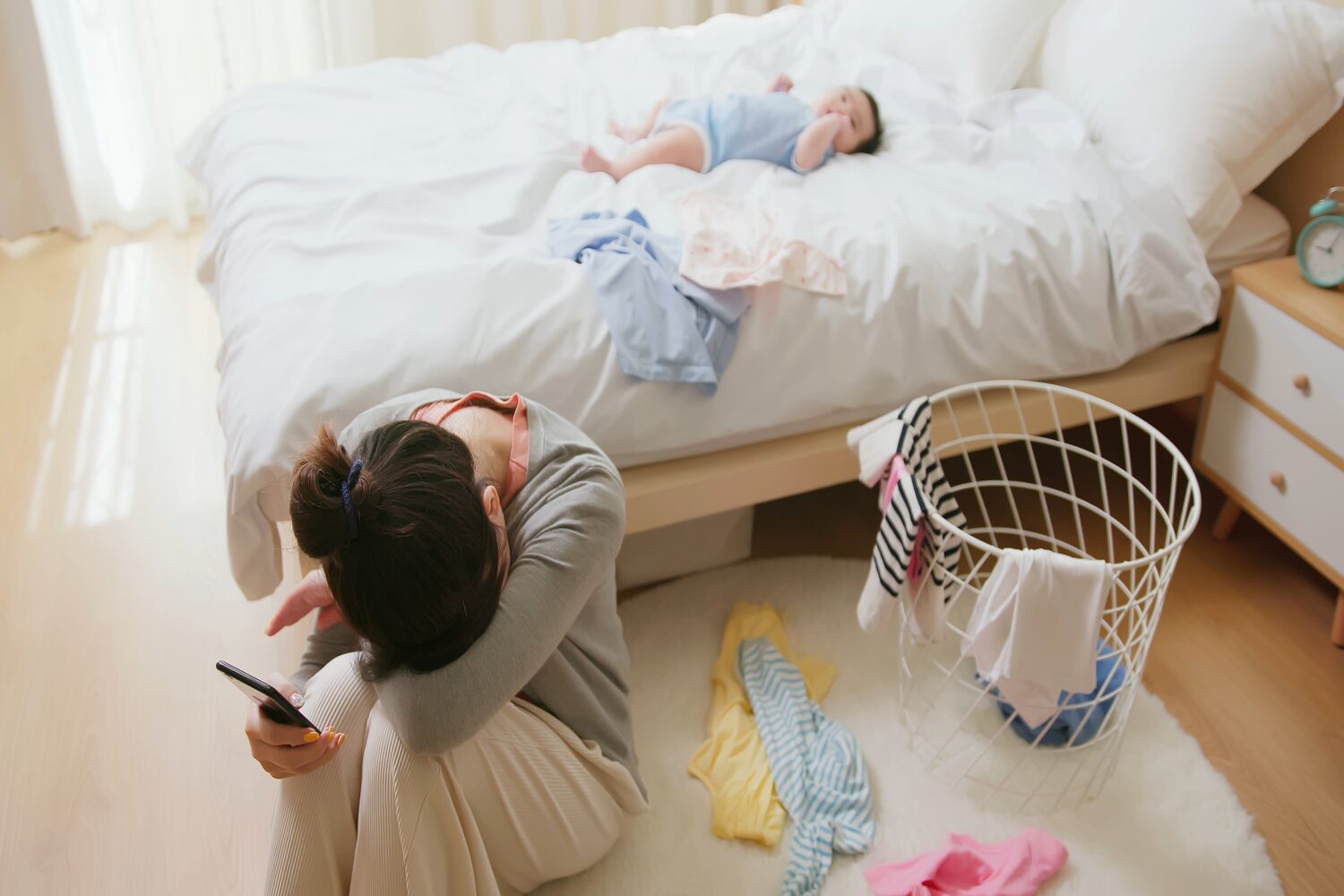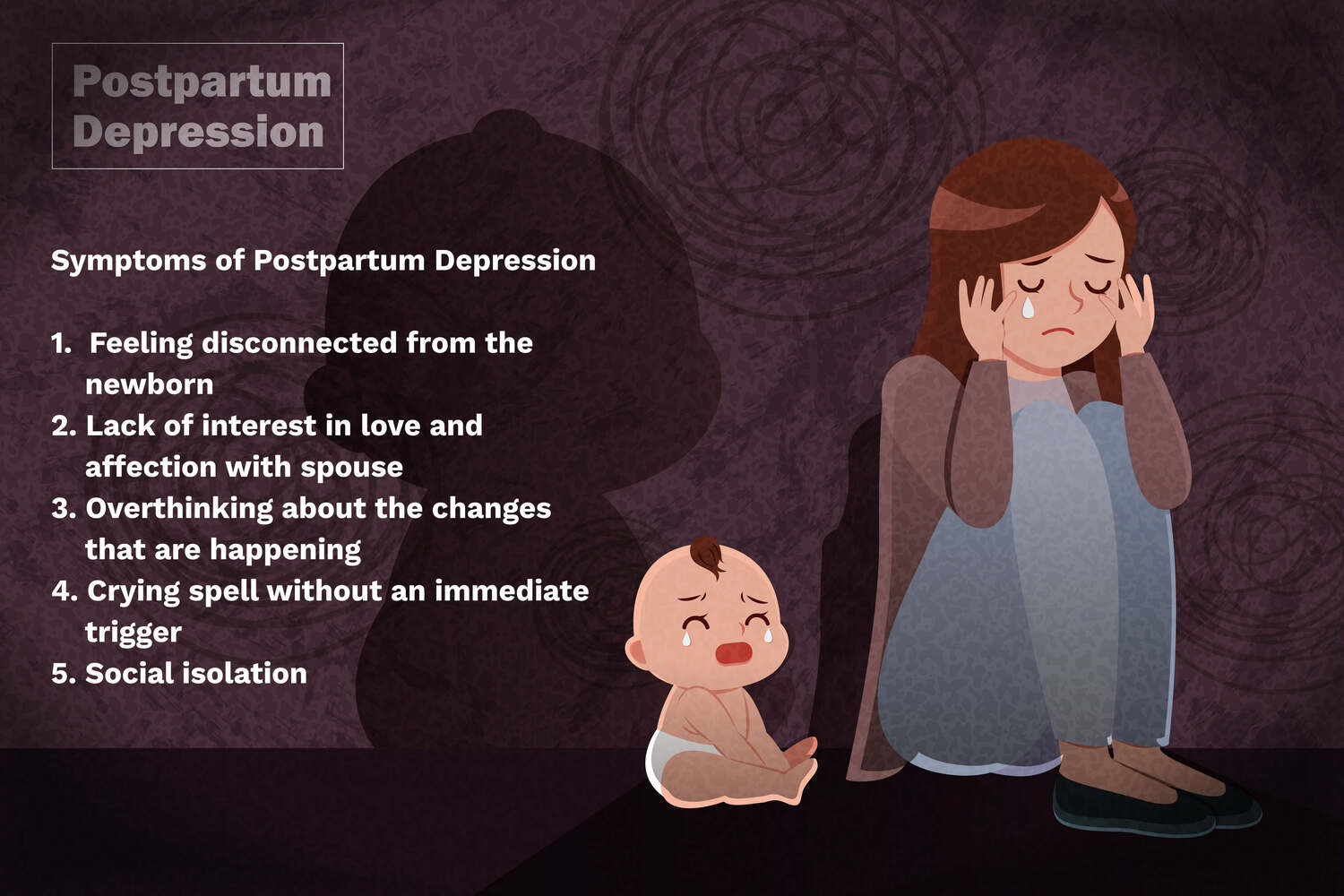
Welcoming a new baby at home brings mixed feelings for the mother. This is primarily due to some significant physical and emotional changes that the process of birthing brings. While happiness and elation are common and to be expected, some moms may also experience unexplained sadness. Postpartum depression is common and is rarely spoken about.
Transitioning into motherhood can be a complicated phase for many women as there are physiological, psychological, and sociological changes that they have to deal with. Easing into these changes can be tough and can result in mental disturbances leading to depression and even psychosis in some rare cases.
In This Article
- What Is Postpartum Depression?
- How Common Is Postpartum Depression?
- Why Does Postpartum Depression Occur?
- Symptoms Of Postpartum Depression
- Postpartum Depression Vs Baby Blues
- Treatment Options For Postnatal Depression
- Tips To Cope With Postnatal Depression
- Does Postpartum Depression Affect The Baby?
- When To Consult The Doctor?
- FAQ’s
What Is Postpartum Depression?
Postpartum depression or PPD is a clinical condition that involves mood swings and irritability and happens in women after childbirth. Persistent feelings of anxiety, low energy, sadness, and irritability are displayed in a mother’s day-to-day behavior. Simply put, PPD is a psychological disorder that manifests nervousness, irritability, and mood swings after the arrival of a baby (1).
This condition impacts a mother’s ability to connect and bond with her baby. It hinders taking care of the newborn and looking after daily activities. This condition also has problems related to intense fear of upcoming responsibilities, not being able to sleep due to overthinking, etc. The mother experiences racing thoughts that make her more anxious and irritable. Emotional highs and lows are also marked with feelings of helplessness.
Recognizing the signs of this mental illness is vital; so that timely treatment is possible. It is vital to enhance the well-being of both the mother and the baby.
Research findings have shown that the symptoms of PPD are similar to clinical depression (2). Consequently, the mother shows persistent sadness accompanied by excessive crying and withdrawal from social connections. The condition also leads to sudden anger outbursts without any immediate trigger.
How Common Is Postpartum Depression?

Postpartum or postnatal depression or PPD is a common psychological condition that can impact 10% to 15% of mothers in a year in the first 6 weeks following childbirth. The mother experiences a brief spell of sadness that goes on for days and weeks if remains untreated.
The condition is common in adolescent females or urban mothers. Study findings also revealed that 50% of mothers with this kind of depression go undiagnosed due to various reasons (3).
Why Does Postpartum Depression Occur?
Postpartum depression occurs due to several reasons. Some of them are
- Tiring process of childbirth
- Change in daily routine due to added responsibilities at home
- Negative self-image issues due to increased body weight, or body shaming by others
- Difficult pregnancy can also downplay the mother’s mood
- Financial hassles at home
- Lack of family support
Symptoms of Postpartum Depression

The symptoms of PPD are hard to notice because they are considered a part of bodily exhaustion and childbirth experience that led to feelings of depression.
Family members may not notice the signs of sadness until some weeks have already passed.
Some of the red flags for this mental health condition are
- Feeling disconnected from the newborn
- Lack of interest in love and affection with spouse
- Overthinking about the changes that are happening
- Crying spell without an immediate trigger
- Social isolation
Postpartum Depression Vs Baby Blues
Studies reveal that baby blues are common and occur in almost 50% of women in the first few weeks of their delivery (4). However, the symptoms are less intense than PPD and usually get resolved without any treatment.
|
Postpartum Depression |
Baby Blues |
|
1. Intense feelings of sadness, anxiety, and crying occur |
1. Mild mood fluctuations are seen |
|
2. Persists longer, for weeks and months, if left untreated |
2. Baby blues are short-lived and get better in a few weeks on their own |
|
3. This can emerge within a year of childbirth or even earlier |
3. Begins a few days after the baby is born |
|
4. The DSM-5 officially considers PPD as a psychiatric condition |
4. Not a serious mental health condition |
|
5. Severe condition and may not happen to every mother |
5. Baby blues are more common than postpartum depression |
Treatment Options For Postnatal Depression
Mental health doctors suggest various treatment options for postpartum depression. The choice includes both medication and psychotherapy that can help new mothers cope with their mood swings and anxiety.
1. Medication
The doctor may suggest anti-depressant drugs to lessen symptoms. These drugs are usually given if the sad mood is persistent along with crying, lack of self-care, and care for the baby.
2. Professional Psychotherapy
Study findings have shown that cognitive behavior therapy (5) is the best therapy form for PPD. The treatment helps to remove unhelpful thoughts and reduces the unhealthy feelings associated with those thoughts. It actually reframes a person’s thought processes just to regulate emotions easily.
3. Support Groups
Joining a support group helps the mother discuss her problems with others in an informal manner (6). They may gather insights to do better self-care and try connecting with their newborn baby.
4. Use of Stress-reduction Tools
Stress reduction and mindfulness techniques can help new mothers deal with postnatal depression (7). Breathing exercises and meditation can help new mothers cope with their maternal anxiety and sadness after childbirth. They can practice regular yoga to keep calm and accept the journey of motherhood happily.
Tips To Cope With Postnatal Depression
If you’re suffering from PPD, you can use some self-help tools to navigate your emotions and feel better.
- You can share your worries and concerns with people near you – friends or family
- Try to take good care of your mind and body by eating healthy and having sleep whenever your baby is sleeping
- Make meditation a daily routine even if it is only for 10-15 minutes
- Share your childcare duties with others at home, or seek help from agencies and professionals
- Maintain a feel-good journal and write about all the positives of childbirth
- Stay close to your baby and try to connect with the tiny soul by cuddling and hugging
Does Postpartum Depression Affect the Baby?
Yes, postpartum depression can impact babies in several ways.
- Lack of attachment with baby leads to feelings of being unloved
- The baby is deprived of basic care
- Neglect and dislike for the newborn lead to emotional problems in the baby
- Lack of nourishment can happen for the baby if the mother resists breastfeeding
- Baby gets cranky as grows up due to emotional neglect from the mother
When To Consult The Doctor?
If the mother feels sad all the time without a definite reason, it’s time to seek help from a professional. When symptoms intensify and start to show up in daily life, then it is best to consult the doctor. Early treatment is always good for the mother who is suffering a lot.
Postpartum depression is a serious concern for new mothers. Therefore, it is best to educate yourself about what parenting looks like after a baby is born. Moreover, it is vital to have a solid support system on whom you can easily lean in times of stress. You should practice self-care and have tons of patience to move through these hard days.
FAQ’s
1. What Makes A Woman Have Postpartum Depression?
A combination of various factors such as additional responsibilities, hormonal changes, and pre-existing mental health issues of the mother can lead to postpartum depression. At times, financial issues, and major setbacks in career can also add to causation.
2. How To Identify That a New Mother Has Postnatal Depression?
Family members can watch for red flags such as fatigue, sleeplessness, mood swings, irritability, and angry outbursts in the mother’s daily behavior. If symptoms do not get better, a clinical diagnosis is recommended.
3. How Can I Cure Postpartum Depression?
The treatment includes therapy, medication, adequate self-care, and building support systems around; so that stress and anxiety can be reduced. You can try these techniques to cure PPD.
4. How Long Does Postpartum Depression Last?
The duration of illness may vary from one person to another. However, the symptoms of sadness along with anxiety may remain for several weeks to a few months and even throughout the first year of childbirth.
5. Can I Avoid Postpartum Depression?
You can try preventing postpartum depression; though prevention is not always guaranteed. By having a strong support system, and addressing stressors during pregnancy, you can reduce the risk of developing this mental health issue.
6. Does Postpartum Depression Go Away?
No, postpartum depression is a clinical condition. Therefore, it cannot go away just like that. It requires some form of treatment to get better. The chances of recovery are high if early diagnosis is done and treatment is sought.
References
- Postpartum depression and associated factors among mothers who gave birth in the last twelve months in Ankesha district, Awi zone, North West Ethiopia | BMC Pregnancy and Childbirth – [https://bmcpregnancychildbirth.biomedcentral.com/articles/10.1186/s12884-019-2594-y]
- Postpartum Depression – StatPearls – NCBI Bookshelf – [https://www.ncbi.nlm.nih.gov/books/NBK519070/]
- Postpartum Depression Statistics | Recent Research and Data About PPD – [https://www.postpartumdepression.org/resources/statistics/]
- Postpartum Blues – StatPearls – NCBI Bookshelf – [https://www.ncbi.nlm.nih.gov/books/NBK554546/]
- Is cognitive behavioral therapy a better choice for women with postnatal depression? A systematic review and meta-analysis – PMC – [https://www.ncbi.nlm.nih.gov/pmc/articles/PMC6188757/]
- Peer-support intervention for postpartum depression: Participant satisfaction and program effectiveness – PubMed – [https://pubmed.ncbi.nlm.nih.gov/29908406/]
- The effectiveness of mindfulness training on reducing the symptoms of postpartum depression – PMC – [https://www.ncbi.nlm.nih.gov/pmc/articles/PMC5586989/]
